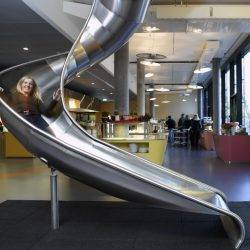August 15, 2017
London Mayor launches strategy to make the city “one of the greenest on the planet”
 The Mayor of London, Sadiq Khan has launched a new environmental strategy which he claims will help make the capital the world’s first ‘National Park City and one of the greenest cities on Earth’. The strategy includes plans for a new £9million Greener City Fund to boost trees and green infrastructure; improved planning policy proposals to encourage more green roofs, green walls and rain gardens; the creation of a ‘Challenge Map’ to prioritise areas in need of green infrastructure; and a series of measures to tackle pollution, promote cleaner energy & make more than 50 per cent of London green by 2050. As part of the strategy, the Mayor will use planning regulations to protect the Green Belt and incorporate into new developments more ‘green roofs’ (roofs covered with grass and plants which are excellent for soaking up rainwater), green walls (which can be added to the outside walls of buildings by busy polluted roads and are covered in plants to help boost air quality), ‘rain gardens’ (small green spaces which help prevent flooding), and habitats for wildlife.
The Mayor of London, Sadiq Khan has launched a new environmental strategy which he claims will help make the capital the world’s first ‘National Park City and one of the greenest cities on Earth’. The strategy includes plans for a new £9million Greener City Fund to boost trees and green infrastructure; improved planning policy proposals to encourage more green roofs, green walls and rain gardens; the creation of a ‘Challenge Map’ to prioritise areas in need of green infrastructure; and a series of measures to tackle pollution, promote cleaner energy & make more than 50 per cent of London green by 2050. As part of the strategy, the Mayor will use planning regulations to protect the Green Belt and incorporate into new developments more ‘green roofs’ (roofs covered with grass and plants which are excellent for soaking up rainwater), green walls (which can be added to the outside walls of buildings by busy polluted roads and are covered in plants to help boost air quality), ‘rain gardens’ (small green spaces which help prevent flooding), and habitats for wildlife.







 UK employment is predicted to grow strongly in the third quarter of 2017, but wage growth is likely to remain weak, according to the latest CIPD/The Adecco Group Labour Market Outlook. Although the UK labour market remains buoyant, basic pay award expectations for the next 12 months remain at just 1 percent. Put against the backdrop of poor productivity growth, the report points to an increase in labour supply over the past year as a key factor behind the modest pay projection. This is driven by relatively sharp increases in the number of non-UK nationals from the EU, ex-welfare claimants and 50-64 year olds. This increase in labour supply may explain why the jobs market remains challenging for some jobseekers, especially those seeking lower-skilled jobs. Employers report a median number of 24 applicants for the last low-skilled vacancy they tried to fill, compared with 19 candidates for the last medium-skilled vacancy and eight applicants for the last high-skilled vacancy they were seeking to fill. Overall, employers felt that around half of applicants were suitable for each role they were trying to fill.
UK employment is predicted to grow strongly in the third quarter of 2017, but wage growth is likely to remain weak, according to the latest CIPD/The Adecco Group Labour Market Outlook. Although the UK labour market remains buoyant, basic pay award expectations for the next 12 months remain at just 1 percent. Put against the backdrop of poor productivity growth, the report points to an increase in labour supply over the past year as a key factor behind the modest pay projection. This is driven by relatively sharp increases in the number of non-UK nationals from the EU, ex-welfare claimants and 50-64 year olds. This increase in labour supply may explain why the jobs market remains challenging for some jobseekers, especially those seeking lower-skilled jobs. Employers report a median number of 24 applicants for the last low-skilled vacancy they tried to fill, compared with 19 candidates for the last medium-skilled vacancy and eight applicants for the last high-skilled vacancy they were seeking to fill. Overall, employers felt that around half of applicants were suitable for each role they were trying to fill.










 The digitisation of the workplace may be seen as a boon to productivity, but that also depends on how well it’s being adopted by the workforce. A new survey claims that one in five (23 percent) UK office workers struggle with technology; and helping to solve the problems of these less tech-savvy employees takes up an average of 17 minutes of their colleague’s working day. The survey from memory and storage firm
The digitisation of the workplace may be seen as a boon to productivity, but that also depends on how well it’s being adopted by the workforce. A new survey claims that one in five (23 percent) UK office workers struggle with technology; and helping to solve the problems of these less tech-savvy employees takes up an average of 17 minutes of their colleague’s working day. The survey from memory and storage firm 













August 14, 2017
Seven ways in which flexible working is making our lives more rigid
by Mark Eltringham • Comment, Flexible working, Technology
(more…)